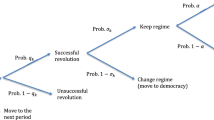Abstract
A debate has emerged whether countries with Muslim majorities are intrinsically more likely to be autocratic. Recent studies have traced this to the allegedly repressive nature of Islam. This article replicates the most recent study on this topic, published in Public Choice (Potrafke in Public Choice 151:185–192, 2012), and demonstrates that the effect is not robust to a number of sensible alterations to the statistical specification. The effect between Islam and democracy is spurious. There is no causal relationship between Islam and democracy.
Similar content being viewed by others
Notes
This response limits itself to the regional dummies in Potrafke’s (2012) original analysis. Yet the regional aggregation underlying these dummies matters. Table A.2 in the Appendix removes MENA countries from Potrafke’s (2012) Asia and Africa dummies and thus uses the MENA countries as a control groups. This simple but sensible alteration, otherwise maintaining the model specification with the same control variables, also reduces the variable capturing Muslim minorities to insignificance, lending further support to the argument that Potrafke’s inferences are incorrect.
References
Aldrich, J. (1995). Correlations genuine and spurious in Pearson and Yule. Statistical Science, 10(4), 364–376.
De Rosa, D., & Iootty, M. (2012). Are natural resources cursed? an investigation of the dynamic effects of resource dependence on institutional quality (World Bank Policy Research Working Paper No 6151). Washington: The World Bank.
Gleditsch, K., & Ward, M. D. (2006). Diffusion and the international context of democratization. International Organization, 60, 911–933.
Potrafke, N. (2012). Islam and democracy. Public Choice, 151, 185–192.
Pripstein Posusney, M. (2004). Enduring authoritarianism: middle east lessons for comparative theory. Comparative Politics, 36(2), 127–138.
Ross, M. L. (2012). The oil curse: how petroleum wealth affects the development of nations. Princeton: Princeton University Press.
Rowley, C. K., & Smith, N. (2009). Islam’s democracy paradox: Muslims claim to like democracy, so why do they have so little? Public Choice, 139, 273–299.
Seldadyo, H., Elhorst, J. P., & De Haan, J. (2010). Geography and governance: does space matter? Papers in Regional Science, 89(3), 625–640.
Zhukov, Y. M., & Stewart, B. M. (2012, forthcoming). Choosing your neighbors: networks of diffusion in international relations. International Studies Quarterly. http://www.wiley.com/WileyCDA/WileyTitle/productCd-ISQU.html (see also http://dash.harvard.edu/handle/1/5142122).
Author information
Authors and Affiliations
Corresponding author
Additional information
Disclaimer: The opinions and findings here are those of the author and do not represent the views of the World Bank or its directors.
Appendix
Appendix
Rights and permissions
About this article
Cite this article
Hanusch, M. Islam and democracy: a response. Public Choice 154, 315–321 (2013). https://doi.org/10.1007/s11127-012-0025-y
Received:
Accepted:
Published:
Issue Date:
DOI: https://doi.org/10.1007/s11127-012-0025-y




